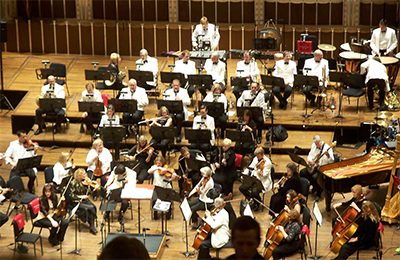by Peter Feher

But he was also hinting at the composer’s influential, all-too-easy-to-imitate style, and piece after piece proved this true, immersing the audience at Severance Music Center in Williams’ sometimes repetitive but always satisfying musical world.
The signature sounds of these famous film scores are not so much John Williams’ invention as allusions to other classical pieces. The foreboding half-step from Jaws, growing more and more furious in the cellos and basses, shares something with Dvořák’s “New World” Symphony and Bartok’s Miraculous Mandarin.
Summon the Heroes, Williams’ theme for the 1996 Olympics, bravely led by trumpeter Gary Davis at Friday’s performance, adapts Copland’s Fanfare for the Common Man. And the music from Star Wars, which bookended the Cleveland Pops’ program, has too many sources to name, not least the otherworldly atmosphere of Holst’s The Planets.
In this sense, Williams’ scores are the perfect choice for a pops concert, serious music made accessible. They were also a surefire hit for the Cleveland Pops’ first performance back from the pandemic. Williams himself is no stranger to the light orchestra setting (he became the Boston Pops music director in 1980), and the obvious pleasure and knowledge coursing through his compositions was matched by Topilow’s conducting and the Cleveland Pops’ playing.
Conductor and ensemble were suited to the composer’s many borrowed styles. Selections from Harry Potter and the Sorcerer’s Stone gave the musicians the full range of orchestral colors to play with, from the first theme on celesta to solos across the woodwind section. The March from 1941 had the group tighten up into a military band — but with a quirk in its step, brought off by precise syncopated rhythms.
Soloists led some of the bigger changes in genre. Klezmer violinist Steven Greenman added authentic flair to a suite from Fiddler on the Roof that began with tunes from the show and transformed into Williams’ score for the film.
Violinist Emera Gurath found a similar old-world sound — mournful vibrato on every note — for the Theme from Schindler’s List. And saxophonist Howie Smith was part of a top-flight trio, along with Bruce Golden on vibraphone and Tim Powell on electric bass, for music from Catch Me if You Can — the movie’s take on progressive jazz.
For all its variety, Williams’ output can repeat itself. The Mission Theme and the March from Raiders of the Lost Ark both stick to a predictable formula: a lush, full ensemble melody against a punchy rhythmic accompaniment. These pieces work individually, but together on the program, they sounded like too much snare drum and too much of the same.
When it comes to William’s best-known works, the formula is inescapable, but the Cleveland Pops made it all part of the fun. Darth Vader came out to conduct the “Imperial March,” and Topilow followed, dressed as Superman, for a finale of that hero’s theme. It was back to Star Wars for the encore, with Topilow on clarinet for the “Cantina Band” music — a predictable end to the evening but delightful all the same.
Published on ClevelandClassical.com November 24, 2021.
Click here for a printable copy of this article


